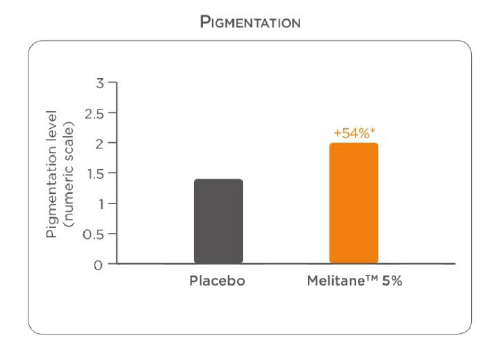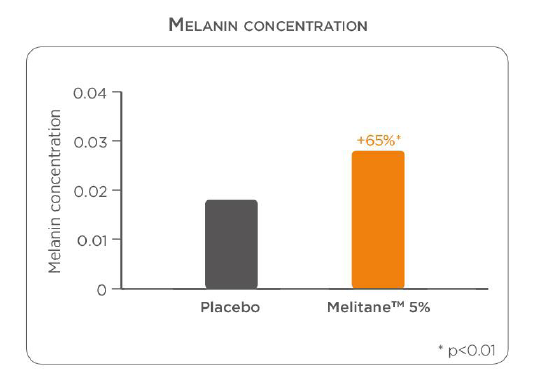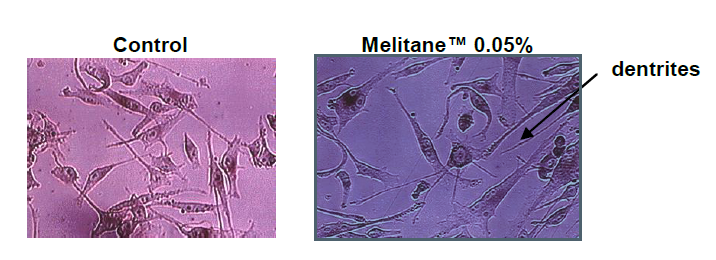An aging population is a good omen for hair dyes, since there are many who consume them to look younger and without gray hair for as long as possible. However, hair dyes are a solution that ends up taking a toll on hair health, as they contain very aggressive ingredients that weaken the hair fiber and its excessive use can lead to the miniaturization of the follicles.
In order to offer alternatives to hair dyes and maintain hair color without damaging it, at REDENHAIR we have developed the ANTIGRAY LOTION, a concentrate of active ingredients that acts to preserve the natural hair color and even reverse the color of gray hair already formed. One of the active ingredients that make up the lotion is MELITANE ™, a powerful peptide that promotes melanogenesis and stops the process of gray hair formation.
What is MELITANE ™?
Melitane ™ is a biomimetic peptide agonist of an important melanocyte-stimulating hormone (-MSH). The biomimetic peptides form a smaller chain than the peptides of the skin and act on the physiological skin mechanisms with a high specificity. The oligopeptides and polypeptides, which are replicated, fulfill important tasks entrusted by peptide hormones, by neurotransmitters or by neuromodulators (neuropeptides).
-MSH is a natural substance produced by the body that participates in various physiological activities such as pigmentation, anti-inflammatory actions, DNA repair and contains propiedades immunosuppressants. This substance binds to its receptor (MC1R), which is expressed in melanocytes and keratinocytes and can trigger several biochemical cascades.
Roles of the hormone α-MSH in skin cells
When α-MSH binds to MC1-R in the melanocytes, MC1-R activates a pathway that induces tyrosinase activity and the production of melanin pigments. The presence and transfer of melanin pigments to the epidermis produces a natural-looking coloration, but also protects the deeper layers of the skin from the harmful effects of UV rays. An α-MSH biomimetic peptide such as Melitane ™ provides such action on pigmentation and deep protection.
On the other hand, the binding of α-MSH to MC1-R in keratinocytes also improves DNA repair by modulating the function of DNA repair molecules. Melitane ™ prevents and limits the damage caused by exposure to UV rays and avoids photo-aging as much as possible. By mimicking the action of α-MSH, this novel ingredient induces pigmentation, DNA protection and repair and anti-inflammatory action.
Action on pigmentation

Pigmentation is the most important protection mechanism against UV radiation. Overexposure to UV rays, as in the skin, also causes hair damage in the short term and can cause several skin diseases and even cancer risk in the longer term.
In vitro studies have shown that Melitane ™ stimulates the synthesis of melanin by increasing the activity of the tyrosinases of the cells in the melanocytes, protecting the hair from the effect of radiation. Similarly, in in active studies, Melitane ™ has shown its effectiveness in the induction of hair pigmentation and in the production of melanin under conditions that induce UV radiation. The result of this action is a significant strengthening of the hair's own protection against daily UV rays that provides a lasting natural color.
Action on DNA
Damage to DNA is one of the most critical causes of hair aging. Reactive oxygen species and UV rays are the two main factors in this deterioration, which can cause erythema, sunburn, gray hair, inflammation, immunosuppression, photoaging, gene mutation and development of cutaneous tumors.

Melitane ™ has been designed to protect cells from DNA damage and to increase the natural skin repair mechanism by mimicking the natural protection and repair system.
Action on inflammation
The inflammation produced by exposure to ultraviolet (UV) light has been well documented clinically and histologically.
Active oxygen radicals are important in the pathogenesis of UV radiation injury. These active oxygen species also lead to the generation of inflammatory mediators such as cytokines, prostaglandins, tumor necrosis factor, interleukins and other metabolites that amplify the inflammatory cascade.
Ultraviolet rays in sunlight destroy cells in the outer layer of the skin, damaging small blood vessels underneath. Once the skin burns, the blood vessels dilate and leak fluid. The visible manifestations of this inflammation are redness, sunburn, swelling, pain, irritation, etc.
The inhibition activity of Melitane ™ in the synthesis of proinflammatory cytokines has been demonstrated in an in vitro study. The anti-inflammatory and soothing properties of Melitane ™ have also been evaluated in a clinical study with 27 volunteers, where Melitane ™ proved to be active in making the skin less sensitive to UV-induced erythema.
By stimulating pigmentation, protecting and repairing DNA damage and reducing inflammation caused by UV rays, Melitane ™ represents an ideal complement to our own levels of natural melanin and strengthens hair's defenses against the damaging effects of UV rays and free radicals.
CLINICAL EFFECTIVENESS STUDIES TEST THE MELITANE ™ CAPACITY
STUDY OF THE EFFECT OF MELITANE ™ ON FOLICULAR PIGMENTATION
The aim of this study was to study the transfer of melanin pigment from melanocytes to keratinocytes in hair bulbs from human skin (scalp) explants containing hair follicles.
A 0.05% Melitane ™ was applied once a day for 7 days on the scalp (skin explants with hair follicles) of 6 volunteers who had brown to black hair. On day 8, the melanin pigments were labeled by specific staining and the number of cells containing melanin pigments was evaluated by light microscopy.
The cells were classified into 4 different categories according to their melanin content before and after treatment, obtaining a significant increase in the number of pigmented cells compared to the start.

Melitane ™ reduces the number of poorly pigmented and non-pigmented cells and increases the number of moderate and highly pigmented cells in the hair bulb, reversing the process of gray hair formation.


STUDY OF MELITANE ™ STIMULATING EFFECTS ON HUMAN MELANOCYTES
The objective of this study was to demonstrate the transfer properties of Melitane ™ by evaluating its effects on the morphology of human melanocytes in vitro.
Melitane ™ was used at a 0.05% concentration to evaluate the transfer of melanosomes. The microscopic observation of the melanocytes after 24h showed characteristic changes. In the absence of stimulation, the melanocytes were globally bipolar. With Melitane ™, they had more dendrites and the cell bodies were larger. In conclusion, it was demonstrated that Melitane ™ induces the formation of dendrites facilitating the transfer of melanosomes (melanin) in the skin. (melanin) in the skin.
CLINICAL EFFECT OF MELITANE ™ ON MELANOGENESIS
When using Melitane ™ in a concentration of 5%, this clinical study allows to evaluate the effect of this active in pigmentation and also in melanin.
12 women were treated with phototypes III and IV with topical applications of a gel with 5% Melitane ™ and also with a placebo gel. 3 parameters were evaluated:
- Pigmentation
- Concentration of melanin for each biopsy performed on each volunteer
- Ultrastructure analysis of skin biopsies in each volunteer
The analysis of the results obtained in the volunteers showed a statistically significant difference between the pigmentation induced by the two products tested.
The area treated with Melitane ™ was 54% more pigmented than that treated with the placebo

Image analysis of a semi-final section of the epidermis showed that the application of 5% Melitane ™ induced a significant 65% increase in melanin relative to the placebo gel.

Finally, the ultra structural analysis of keratinocytes and melanosomes was performed in an electron microscope after ultra-thin sections of biopsies.
In conclusion, it could be verified that Melitane ™ stimulates pigmentation and melanin pigment, a natural protection factor under UV radiation.
- In addition to these in vitro and clinical studies, which provide evidence of Melitane ™ -MSH agonist activity, this active reproduces all the biological phenomena observed after the stimulation of melanogenesis:
- Melanotropic activity: synthesis of melanin, tyrosinase activity, pigmentation.
- Anti-inflammatory activity: decrease in proinflammatory cytokines, prevention of erythema.
The topical application of a gel with Melitane ™ stimulates the synthesis of melanin and its distribution in the scalp, which allows it to perform all its protective functions against UV radiation and free radicals.
In addition, Melitane ™ limits the inflammatory activity of the skin and protects the body from structural damage caused by UV radiation.
The natural stimulation of melanogenesis by Melitane ™ together with its reducing effect of inflammation and allergy on the scalp makes it an ideal active ingredient for the reduction of gray hair.
¿WHERE TO FIND MELITANE ™?
After learning a little more about this peptide and its revealing efficacy and clinical studies, you're sure you want to know where to get it. Because it is an exclusive ingredient to treat the appearance of gray hair, you can locate it in our REDENHAIR ANTIGRAY LOTION.

The lotion that, in addition to a powerful ingredient such as MELITANE ™, also contains GREYVERSE ™, TRICO HYAL® NUCLEO, REDENSYL® and CHROMAFEND ™ BIOFUNCTIONAL ™, the combination with the most beneficial effect for hair health, the disappearance of gray hair and the arrest of hair loss.
The continuous innovation and our great team of experts achieve maximum efficiency of our products, for this reason we are pioneers in the development of products that take care of capillary health to the maximum.
And remember ... Every month we make raffles and exclusive offers in our Social Networks! So follow us on Instagram or Facebook and enjoy our promotions.


 GREYVERSE™, ACTIVE PRINCIPLE OF REDENHAIR ANTI-GREYING RITUAL
GREYVERSE™, ACTIVE PRINCIPLE OF REDENHAIR ANTI-GREYING RITUAL
 Myths about hair fibers Are they harmful to our hair?
Myths about hair fibers Are they harmful to our hair?
 MANY CELEBRITIES ALREADY USE OUR LASER HELMET (LLLT)
MANY CELEBRITIES ALREADY USE OUR LASER HELMET (LLLT)
 REDENHAIR REGENERATING BRUSH VS REDENHAIR REGENERATING HELMET
REDENHAIR REGENERATING BRUSH VS REDENHAIR REGENERATING HELMET
 ENJOY THE BENEFITS OF COLLAGEN WITH REDENHAIR
ENJOY THE BENEFITS OF COLLAGEN WITH REDENHAIR
 SANDALWOOD, ALLY IN THE FIGHT AGAINST ALOPECIA
SANDALWOOD, ALLY IN THE FIGHT AGAINST ALOPECIA
 THE PHASES OF A HAIR TRANSPLANT AND THE ALTERNATIVE REDENHAIR OFFERS YOU
THE PHASES OF A HAIR TRANSPLANT AND THE ALTERNATIVE REDENHAIR OFFERS YOU
 WHAT IS FEMALE ALOPECIA FOR AGING AND HOW TO TREAT IT?
WHAT IS FEMALE ALOPECIA FOR AGING AND HOW TO TREAT IT?
 LATEST TECHNOLOGY FOR HAIR BASED ON LASER LIGHT
LATEST TECHNOLOGY FOR HAIR BASED ON LASER LIGHT
 Saltpeter and hair
Saltpeter and hair
 What is dandruff? What types of dandruff are there?
What is dandruff? What types of dandruff are there?
 At what age can we start using anti-hair loss products?
At what age can we start using anti-hair loss products?





